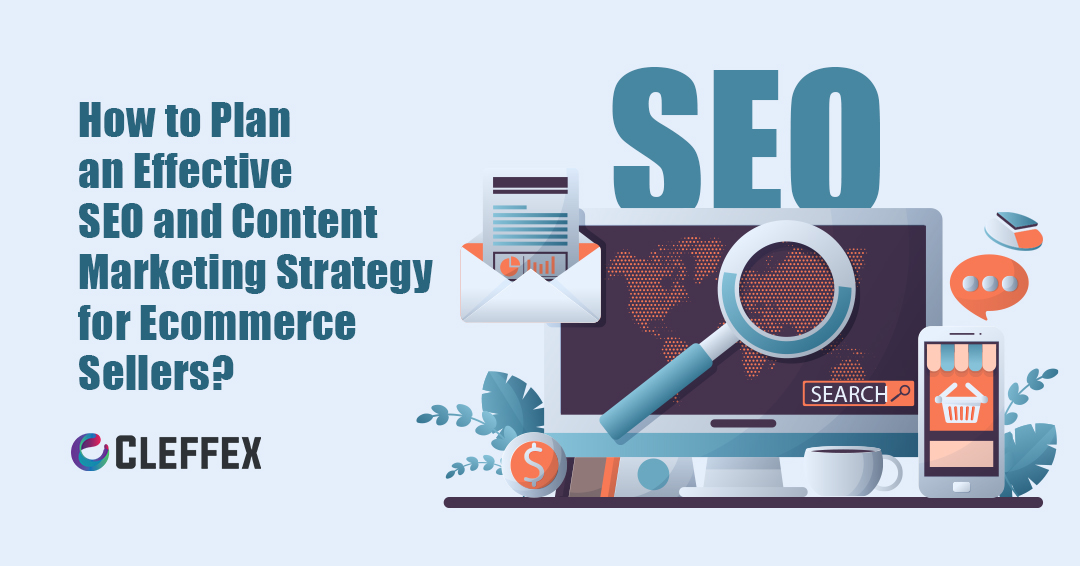SEO and content marketing play crucial roles in online marketing, especially for e-commerce sellers. A strong strategy for both is vital for success in e-commerce. Effective e-commerce SEO is crucial for enhancing organic visibility in search engines, outperforming competitors in search results, and attracting new customers from Google and other search engines. Content marketing, on the other hand, is a long-term approach to attracting and retaining customers through valuable and relevant content, driving organic traffic and leads. Therefore, an effective content marketing strategy for ecommerce sellers is necessary.
Developing a successful strategy that blends SEO and content marketing is crucial for e-commerce companies. Here are a few tips and tricks for creating a successful and effective SEO and content marketing strategy for ecommerce sellers.
Search Engine Optimization (SEO) : Digital Marketing Strategy for Ecommerce Sellers
To enhance a website’s ranking on search engine results pages (SERPs) and attract higher web traffic, the practice of optimizing a website for Google search is known as SEO. The ultimate aim of SEO is to improve the site’s visibility by appearing among the top search results for relevant keywords or phrases.
Factors that impact a website’s SEO include the quality of content, the number of backlinks, and user experience. Although optimizing your website’s SEO can be a challenging and lengthy process, it is worth the effort to increase your visibility on search engines. As a crucial aspect of your ecommerce marketing plan, SEO should not be seen as an isolated entity but as a means to drive traffic to your website, which can then be converted into leads and potential customers.
What is the function of SEO in Ecommerce?
SEO for e-commerce is about attracting organic traffic that converts into sales by optimizing your website for relevant keywords that potential customers are searching on search engines. The ranking of results on a search engine such as Google is determined by the algorithm, which considers over 200 factors, including the quality of your site’s content, website user-friendliness, backlinks from other sites, and loading speed. To improve your website’s SEO, it’s crucial to focus on these ranking factors and make your site as optimized as possible. It may require effort and time, but the outcome of increased visibility in SERPs and more organic traffic will make it worthwhile in the long run. SEO is an essential part of the ecommerce digital marketing strategy.
Top SEO Tactics for Ecommerce Websites
When it comes to selecting appropriate SEO techniques for your eCommerce business, there are a variety of tactics to consider. It’s important to keep in mind that not every SEO strategy will be effective for every business. Select the right SEO methods that fit your business objectives taking into account factors like your goals, target audience, and budget.
To optimize your ecommerce website for search engines, you can implement techniques such as optimizing your product pages with relevant keywords, producing blog content centred around relevant topics, and acquiring backlinks from other websites.
Below are a few SEO Strategies for ecommerce sites. These marketing strategies for ecommerce sellers are the best. Take a look at them:
1. Goal of an On-page SEO for Ecommerce
The goal of On-page SEO, also known as technical SEO, is to improve the visibility and user experience of a website. This is done by optimizing the site’s content and structure, such as using the right keywords, having a fast-loading website, and making sure the site is mobile-friendly.
2. Internal Linking
Internal linking involves connecting pages within your website through links within your content. This can improve your website’s SEO by assisting Google in indexing and comprehending the connections between pages. Additionally, it enhances the user experience by enabling visitors to easily locate the desired information. To apply internal linking, include links to other pages on your site within blog posts or articles. Additionally, you can include internal links on your category pages and product pages to guide customers to related items of interest. However, it is crucial not to overuse links as excessive linking can harm your website’s SEO.
3. Look for Suitable Keywords
Finding suitable keywords is a crucial step in enhancing your website’s search engine optimization (SEO). These keywords are the specific phrases or terms that your potential customers search for on Google in relation to products or services like yours. There are various keyword research tools that can aid in discovering keywords for your e-commerce site. After compiling a list of keywords, it’s crucial to evaluate their relevance to your business.
When selecting target keywords, it’s essential to consider factors like high search volume, level of competition, keyword rankings, and commercial intention. Once you have a list of keywords, you can begin incorporating them into your website’s content. Keep in mind that there is a distinction between keywords for information purposes and those with purchase intent.
- Different Types of Keyword Research Techniques for Ecommerce
When conducting keyword research for an e-commerce site, it’s important to consider the motivation behind why a person may type a certain keyword or phrase into a search engine. Informational keywords, such as “How to start a startup,” are typically used by people seeking information and have a low intention to make a purchase. Conversely, keywords with high purchase intent, such as “cheapest fossil watch online,” indicate a person’s readiness to buy a product or service.
To boost sales, it’s important to target keywords with high purchase intent as they are more likely to convert to sales. These should be a priority for your business. Additionally, utilizing long tail keywords, which are more specific and usually have lower search volume, can also be valuable. They tend to have less competition, making them easier to rank for, and due to their specificity, they often have a higher purchase intent. This is such an important marketing strategy for ecommerce sellers.
4. Product Page Optimization
Your product page is an important component of your e-commerce website as potential customers will arrive on this page when searching for the products or services you offer. To increase the likelihood of making a sale, it’s important to optimize these pages for SEO by including your target keywords in the title, description, and other relevant parts of the page.
- Incorporate High-Quality Images and Videos in Your Products Pages
Having high-quality images and videos on your product pages is also important for enhancing your SEO. Today’s customers want to see what they are purchasing before making a purchase, and images and videos can provide a better understanding of the product’s appearance and functionality, increasing the chances of a sale. Furthermore, Google’s ranking algorithm now considers the quality of images and videos on websites, making it imperative to ensure your product pages use high-quality visuals. Follow this ecommerce marketing strategy strictly!
5. Strategies for Link Building
Link building involves obtaining links from other websites that direct to your website. This is crucial as Google’s algorithm considers the number of backlinks when determining a website’s ranking. Thus, the more backlinks you have, the higher your website will appear in search results. There are various tactics to build links, such as including internal links, guest blogging, producing infographics, and participating in online forums, to increase the number of backlinks and drive more traffic to your e-commerce site.
- Broken Link Building
Broken link-building is an efficient link-building technique that involves locating websites that link to non-functioning pages on your website and informing the website owner. Many website owners will be eager to update the link to a functional page on your site, thereby enhancing your website’s SEO. Furthermore, it is an excellent method to establish relationships with other website owners in your field.
6. Local SEO
If you run both a physical and an online store, local SEO is crucial. This involves optimizing your website for regional keywords, such as the name of your town or region, making it simpler for prospective customers to locate your business when searching for products or services you offer. To optimize your website for local SEO, you can implement strategies such as creating pages specific to your location, listing your business in online directories, and utilizing geo-targeted keywords.
7. Create Captivating Blog Content
To boost your ecommerce website’s SEO, it is crucial to produce engaging blog content related to relevant topics. This will draw in prospective customers and enhance your chances of making a sale. While writing blog posts, make sure to include target keywords throughout the content. Nevertheless, prioritize creating high-quality and interesting material. If the blog content is uninteresting or poorly written, readers will not be interested, and it is unlikely that they will convert into customers. This is an important marketing strategy for ecommerce sellers. Ensure that you follow it!
Now let’s move on to discuss content marketing strategies for ecommerce sellers.
Content Marketing: Digital Marketing Strategy for Ecommerce Sellers
Content marketing involves the creation and distribution of valuable and relevant content to engage a specific target audience with the aim of encouraging profitable customer action. It is important for your content marketing plan to be in line with your overall business strategy for it to be effective. The common objectives of content marketing include, boosting brand recognition, acquiring leads and sales, establishing trust and credibility, and fostering customer loyalty. Moreover, it is a critical factor for the ecommerce digital marketing strategy.
Various Content Marketing Assets
The creation of various content marketing assets, such as blog posts, ebooks, infographics, webinars, and white papers, can greatly help your ecommerce marketing efforts. To be successful, the content must be relevant and of value to your target audience. If the content lacks interest or practical use, it won’t attract readers or be shared.
Different forms of content that can be created for ecommerce marketing purposes include, how-to articles, review of products, updates on the industry, case studies, and visual media(videos).
Your Ecommerce Website needs an Effective Content Marketing Strategy. How Will You Create it?
The next step in creating a successful content marketing strategy for your e-commerce site is to identify your goals. Ask yourself what outcomes you hope to achieve with your content marketing efforts. Once you have a clear idea of what you want to achieve, you can begin to map out a plan to reach those goals.
Your content marketing plan should have the following components:
Content schedule: A calendar that helps plan and organize your content ahead of time.
Distribution plan: A strategy to figure out where and how to share your content.
Content promotion: Efforts to make your content visible, such as using social media, email marketing, and paid advertising to promote it.
Developing a content strategy can be challenging, but it’s essential for attracting visitors to your website and producing leads and sales. By investing time in creating meaningful content that appeals to your target audience, you can design a content marketing strategy that will improve your organic traffic, lead generation, and sales. Make sure you follow this useful ecommerce marketing strategy.
Social Media Marketing
Social media marketing involves promoting and selling products or services on various social media platforms. Common platforms for e-commerce businesses include Facebook, Twitter, Instagram, and Pinterest. When creating a social media strategy, it’s crucial to determine the most effective platform and accounts based on factors such as the nature of your products, i.e. platforms like TikTok, Instagram, and Pinterest may be better suited for businesses with visually appealing products.
Final Thoughts
Having a good understanding of SEO and content marketing is crucial for e-commerce business owners to successfully drive traffic to their website, improve their organic search rankings, and attract new customers. These two digital marketing strategies play a key role in helping people discover your products and making purchases.
In developing your SEO and content marketing plan, keep your target audience in focus. The creation of valuable and applicable content to your target audience is important in attracting visitors and creating leads and sales. By carefully constructing a comprehensive SEO and content marketing strategy, you can establish a strong e-commerce brand that appeals to your customers.
Consider reaching out to a reliable digital marketing company to improve your conversion rate. Our professionals are available to provide you with assistance!









